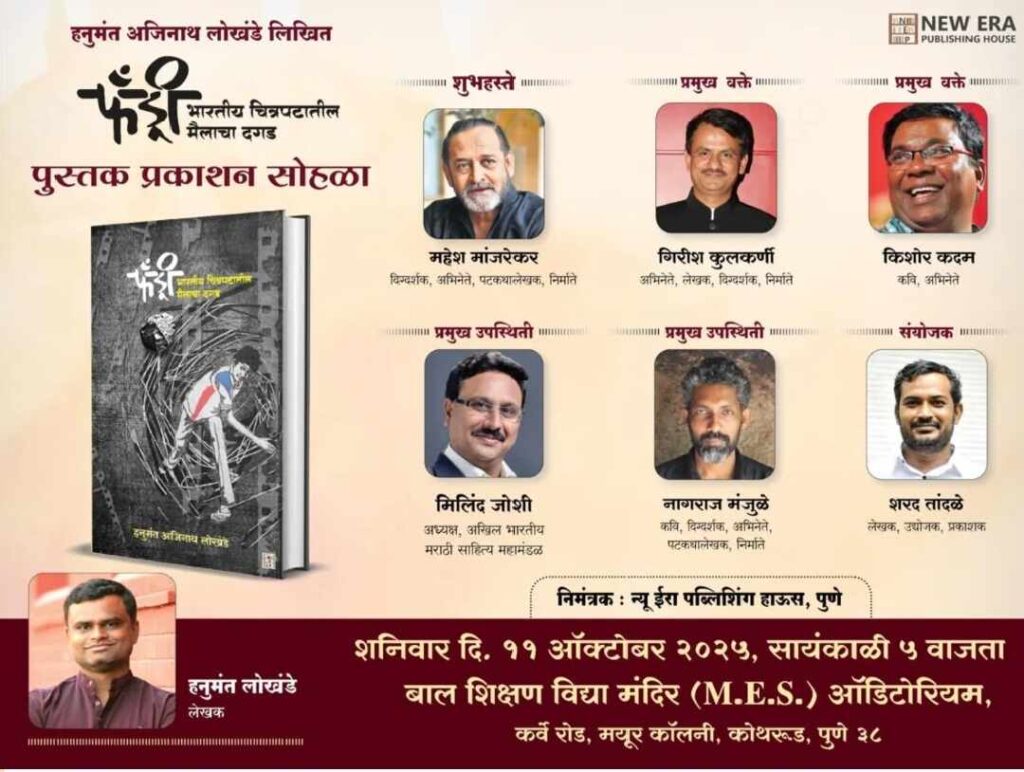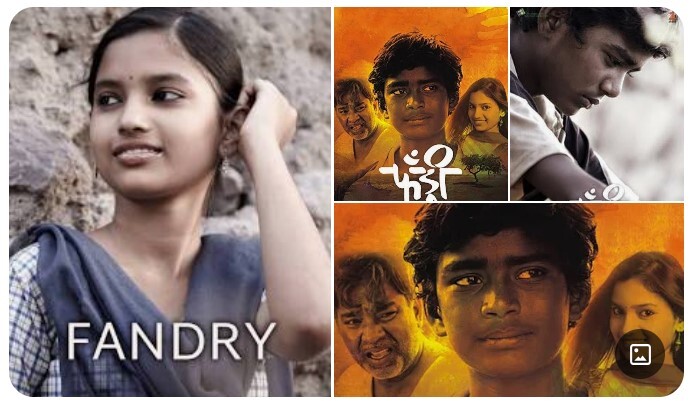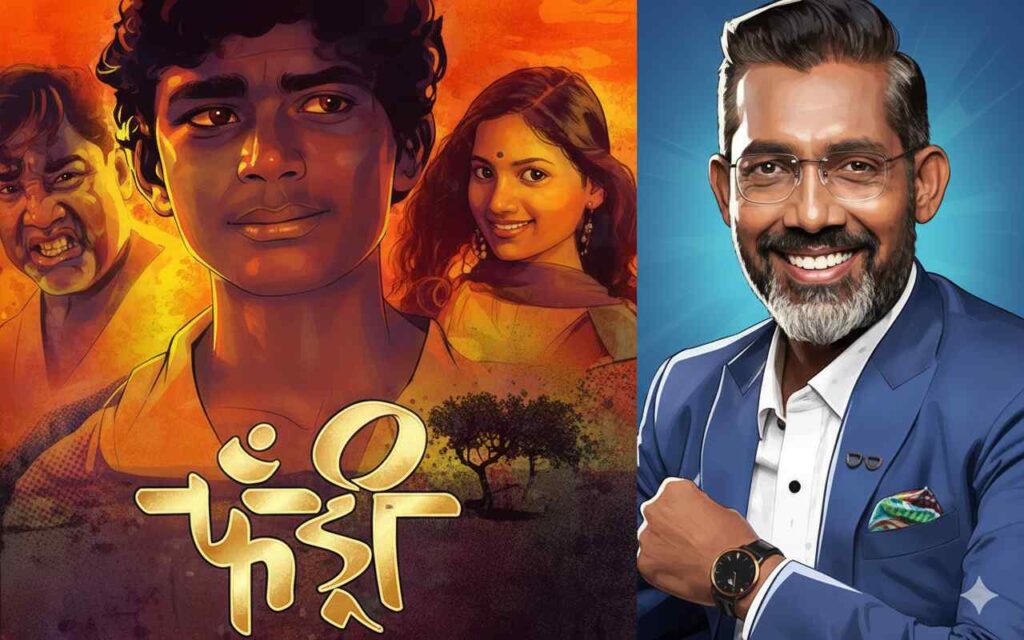Pune, Maharashtra – The indelible mark left on Indian cinema by director Nagraj Manjule’s debut feature, the hard-hitting and critically acclaimed Marathi film Fandry, is set to be cemented in literary history. A new, comprehensive book analyzing the film’s cultural, social, and cinematic impact, titled “Fandry: Milestone in Indian Cinema” (फँड्री भारतीय चित्रपटातील मैलाचा दगड), is scheduled for a grand public release on Saturday, October 11, 2025.

The book launch, an event already generating buzz across film, literature, and social justice circles, promises to be a significant gathering. Confirmed to grace the occasion are some of the most respected and influential names in Marathi and Indian cinema, including director Mahesh Manjrekar, actor-writer-director Girish Kulkarni, veteran actor Kishore Kadam, the film’s own visionary creator, Nagraj Manjule, and other notable personalities like Milind Joshi and Sharad Tandale. The event, organized by New Era Publishing House, Pune, is not merely a book release; it is a festival celebrating the defiant, enduring spirit of Fandry.
Table of Contents
The Enduring Cinematic Power of Fandry: More Than Just a Film
The 2013 cinematic masterpiece, Fandry, remains one of the most potent and unflinching critiques of caste discrimination in contemporary India. Directed by the then-debutant Nagraj Manjule, the film introduced the world to the painful, suppressed life of Jambhuvant ‘Jabya’ Mane, a young boy from the Kaikadi community—a marginalized caste—who is forced to live on the outskirts of an upper-caste dominated village, Akolner. The film’s title, derived from a slur meaning ‘pig’ in the Kaikadi language, encapsulates the humiliation and dehumanization faced by Jabya and his family, whose meager livelihood often involves the menial and socially degrading task of catching and disposing of wild pigs that roam the village.
The narrative of Fandry is heartbreakingly simple yet universally profound. Jabya, played with raw authenticity by Somnath Awghade, harbors an innocent, unreciprocated crush on his upper-caste classmate, Shalu. This adolescent yearning becomes a powerful metaphor for his deep-seated desire to break free from the invisible but unbreakable boundaries of caste. His quest to catch a mythical black sparrow, believed to possess the power to make Shalu fall in love with him, symbolises his futile, almost magical attempt to transcend his social reality.
The climax of Fandry is a masterclass in socio-political cinema. When Jabya’s entire family is publicly humiliated while catching a pig, his shame—which he has fought so hard to conceal—explodes into a moment of defiant rage. Dropping the pig, he turns and throws a stone at his tormentors, a silent, furious act that acknowledges the suffocating reality of his identity. This final, explosive moment is what elevated Fandry from a mere film to a revolutionary statement, a cinematic ‘milestone’ that perfectly captures the internalised shame and subsequent, inevitable anger of the oppressed.
This core conflict—the personal dream against the historical-social reality—is what the new book seeks to analyze in intricate detail. The continuing relevance of Fandry in today’s social climate, where caste-based violence and discrimination still persist, makes this book an essential read for scholars, filmmakers, and anyone concerned with human rights and social equity. The film acted as a crucial precursor to Manjule’s even bigger commercial success, Sairat, but many critics and cinephiles argue that the raw realism and uncompromising ending of Fandry give it a unique place in the history of Indian independent cinema.

Dissecting the Milestone: Hanumant Adinath Lokhande’s Scholarly Work
The book, “Fandry: Milestone in Indian Cinema,” is authored by Hanumant Adinath Lokhande, an academic and writer known for his insightful contributions to the study of Dalit literature and cinema. Lokhande’s decision to focus an entire book on a single film underscores the sheer weight and consequence of Fandry in the cultural discourse.
The text is expected to be a thorough and deeply researched exploration, moving beyond a simple film review to a multi-layered academic analysis. Early reports suggest the book is structured to delve into several critical dimensions of the film, providing fresh perspectives that were previously only discussed in academic papers and critical essays.
One anticipated chapter is likely to be dedicated entirely to ‘The Symbolism of the Pig and the Sparrow’—a deep dive into how Manjule uses the animals in Fandry to represent both the lowest point of social existence (the pig/slur) and the highest point of impossible aspiration (the elusive black sparrow). Another section, potentially titled ‘The Aesthetics of Caste Realism,’ is expected to analyze Nagraj Manjule’s directorial style—his use of non-professional actors, naturalistic settings, and the deliberate pacing that builds to the devastating climax. This section will likely compare and contrast Manjule’s work with other pioneers of realistic, socially conscious cinema.
Furthermore, the book is poised to include an exclusive interview or detailed commentary from Nagraj Manjule himself, offering first-hand insights into his semi-autobiographical inspirations, the challenges of filming such a sensitive subject, and his own reading of the powerful final scene. Such detailed, critical analysis from an authoritative voice like Lokhande is why the book has earned the designation of a ‘Book Publishing Festival,’ positioning it as the definitive literary companion to the film Fandry.

A Confluence of Cinematic Greats: The Festival Guests
The launch event is notable for the galaxy of stars and industry stalwarts it has attracted, a testament to the respect commanded by the film Fandry and its director, Nagraj Manjule.
Mahesh Manjrekar, a titan of Marathi and Hindi cinema, is a particularly significant presence. Known for his directorial ventures that often explore the gritty, complex realities of urban and rural life, his patronage of the book highlights the industry’s acknowledgment of Fandry as a seminal work. His speech is expected to focus on the evolution of socially relevant filmmaking and how Manjule successfully bridged the gap between niche, festival-circuit cinema and mainstream acclaim.
Girish Kulkarni, a National Award-winning actor and writer, is an intellectual powerhouse of Marathi cinema. His involvement suggests the book will be discussed not just for its subject matter but for its literary merit and the importance of documenting cinematic history. Kulkarni is likely to offer a writer’s perspective on the film’s sparse, powerful dialogue and its subtext-heavy narrative—aspects that make Fandry a masterclass in screenwriting.
The presence of Kishore Kadam is especially poignant. Kadam played the role of Kachru Mane, Jabya’s submissive, tradition-bound father, whose acceptance of his fate fuels Jabya’s final rebellion. Kadam’s on-stage recollections of playing such a complex and tragic character will undoubtedly lend a deeply personal and emotional dimension to the book launch. He represents the older generation that Jabya fights against, making his testimony an essential part of the film’s deconstruction.
Finally, the participation of Nagraj Manjule himself, alongside his peers, rounds out the evening. A celebrated poet whose work often addresses the same themes of caste, indignity, and revolutionary anger, Manjule will have the unique opportunity to discuss how his poetic sensibilities translated into the visual language of Fandry. His presence will also serve as a nod of approval to Lokhande’s scholarly work, confirming the book’s status as a canonical text on his debut. The discussion is expected to be moderated by noted cultural commentators like Milind Joshi and Sharad Tandale, ensuring a robust and engaging dialogue that unpacks the multiple layers of Fandry.
The Unstoppable Legacy of Fandry in Indian Cinema
The launch of “Fandry: Milestone in Indian Cinema” on October 11, 2025, is a timely reminder of the film’s crucial role in shaping the modern narrative of Indian cinema. Before its global recognition and blockbuster success with Sairat, it was Fandry that first established Nagraj Manjule as a unique, fearless voice. The film’s critical success—winning the Indira Gandhi Award for Best Debut Film of a Director at the 61st National Film Awards—showed that audiences and critics were ready for stories that tackled the uncomfortable truths of Indian society.
Fandry proved that a low-budget, regional film focusing on a seemingly localized social issue could resonate with global audiences due to its universal themes of adolescent desire and institutionalized oppression. It laid the emotional and stylistic groundwork for a new wave of Marathi cinema that has since become a benchmark for social realism in India. The film’s raw, naturalistic style contrasted sharply with the melodramatic tendencies of earlier cinema, ushering in an era of authentic storytelling. The movie became a case study for new filmmakers on how to use cinematic art to make a powerful socio-political statement without sacrificing narrative or emotional depth. The sheer volume of academic papers and articles written about the film since its release, which the book will now synthesize and expand upon, is proof of its enduring influence.
The enduring impact of Fandry is perhaps best measured by the conversations it continues to provoke a decade after its release. It is a film that challenges viewers, forces them to look beyond the veneer of ‘modern’ India, and confront the deeply entrenched prejudices that continue to shape the lives of millions. The very existence of a comprehensive, scholarly book on this single film underscores its transition from a cinematic event to a permanent fixture in India’s cultural and intellectual landscape.
Conclusion: Why This Fandry Event Matters
The upcoming book launch on October 11, 2025, is more than a mere publication ceremony; it is a vital cultural event that celebrates the power of cinema to ignite social change. “Fandry: Milestone in Indian Cinema” will undoubtedly become the go-to resource for anyone studying the social, political, and artistic nuances of Nagraj Manjule’s masterful debut. The presence of cinema heavyweights like Manjrekar, Kulkarni, and Kadam confirms the book’s importance, solidifying the fact that Fandry is a film whose story and impact must continue to be studied, discussed, and understood. For cinephiles and students of culture alike, this event in Pune marks the beginning of a new, in-depth exploration into the masterpiece that is Fandry. Make sure to follow updates on New Era Publishing House channels for details on securing a copy of this essential volume.

